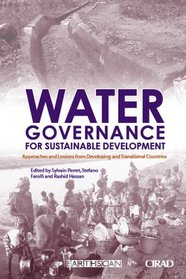Search -
Water Governance for Sustainable Development: Approaches and Lessons from Developing and Transitional Countries
Water Governance for Sustainable Development Approaches and Lessons from Developing and Transitional Countries
The management of, and access to, water resources have been universally identified as a key aspect of poverty reduction, agriculture and food security and sustainable development in developing, transitional, and developed countries worldwide. Yet good ?water governance,? so eagerly sought, has in practice proven difficult to achieve. This book, ... more »
The management of, and access to, water resources have been universally identified as a key aspect of poverty reduction, agriculture and food security and sustainable development in developing, transitional, and developed countries worldwide. Yet good ?water governance,? so eagerly sought, has in practice proven difficult to achieve. This book, ... more »
ISBN-13: 9781844073191
ISBN-10: 184407319X
Pages: 368
Rating: ?
ISBN-10: 184407319X
Pages: 368
Rating: ?
0 stars, based on 0 rating
Publisher: Earthscan Publications Ltd.
Book Type: Hardcover
Members Wishing: 0
Reviews: Amazon | Write a Review
Book Type: Hardcover
Members Wishing: 0
Reviews: Amazon | Write a Review
Genres:
- Business & Money >> Economics >> Development & Growth
- Business & Money >> Economics >> Environmental Economics
- Business & Money >> Popular Economics
- Nonfiction >> Politics >> Globalization
- Science & Math >> General
- Science & Math >> Nature & Ecology >> Water Supply & Land Use
- Science & Math >> Agricultural Sciences >> Irrigation
- Engineering & Transportation >> Professional Science >> Agricultural Sciences >> Irrigation
- Outdoors & Nature >> Environment >> Water Supply
- Outdoors & Nature >> Conservation >> Water
- Outdoors & Nature >> Ecology >> Living on the Land




